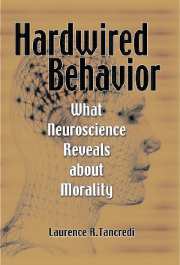Book contents
- Frontmatter
- Contents
- Preface
- Acknowledgments
- 1 Neuroscience and Morality
- 2 Morality and the Mind
- 3 Beyond the Mind Zone
- 4 The Moral Brain
- 5 Bad without Conscience
- 6 The Biology of Choice
- 7 Sex and the Single Moral Code
- 8 Brain Biology and Sex
- 9 Deception
- 10 The Biology of Money
- 11 The Bad and the Mad
- 12 Creating a Moral Brain
- Notes
- Glossary
- Index
2 - Morality and the Mind
Published online by Cambridge University Press: 13 October 2009
- Frontmatter
- Contents
- Preface
- Acknowledgments
- 1 Neuroscience and Morality
- 2 Morality and the Mind
- 3 Beyond the Mind Zone
- 4 The Moral Brain
- 5 Bad without Conscience
- 6 The Biology of Choice
- 7 Sex and the Single Moral Code
- 8 Brain Biology and Sex
- 9 Deception
- 10 The Biology of Money
- 11 The Bad and the Mad
- 12 Creating a Moral Brain
- Notes
- Glossary
- Index
Summary
Men ought to know that from the brain, and from the brain only arise our pleasures, joys, laughter and jests, as well as our sorrows, pains, griefs and tears. Through it, in particular, we think, see, hear and distinguish the ugly from the beautiful, the bad from the good the pleasant from the unpleasant. It … makes us mad or delirious, inspires us with fear, brings sleeplessness and aimless anxieties. … In these ways I hold that the brain is the most powerful organ in the human body.
Hippocrates (c. 460 bc–c. 377 bc), from “The Sacred Disease”One of the most astonishing things in the history of the brain is the seesawing between mentalism (focus on the mind as separate from the brain) and physicalism (emphasis on the primacy of the physical brain). As early as 400 BC, Hippocrates acknowledged the brain as the center of human emotions and thinking. During the ensuing centuries this viewpoint moved like a pendulum from that position to one espousing the dynamics of mental processes. Now, it appears, we are returning to a belief in the primacy of the brain.
When I began my practice in the late 1970s, psychiatry was in transition. A different model was replacing psychoanalytical explanations for mental and emotional illnesses, which had focused on the impact of infant and childhood development, particularly interactions with parents and siblings, for creating adult neuroses and psychoses. Research on behavioral genetics and brain neurotransmitters was bearing fruit, so that by the 1990s there was increasing acceptance of the notion that serious mental illness had its origins in biological dysfunction.
- Type
- Chapter
- Information
- Hardwired BehaviorWhat Neuroscience Reveals about Morality, pp. 12 - 24Publisher: Cambridge University PressPrint publication year: 2005



